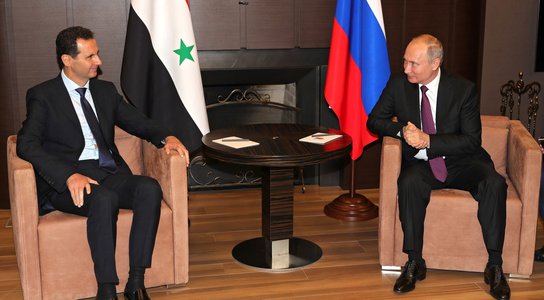This barrel bomb was different. This one sent up plumes of yellow vapor, a tell-tale sign of chlorine attack.
Dr. Abdullah Darwish had seen barrel bombs before. As the director of the hospital in Kafr Zeita, a town near Hama in Syria, he had treated many of their victims, their flesh torn by the scrap metal packed around the explosive core.
One of the 150 victims of the attack on April 11, 2014 had a head injury, but most showed unusual symptoms. Civilians, including many children, streamed into the hospital, vomiting and with eyes burning.
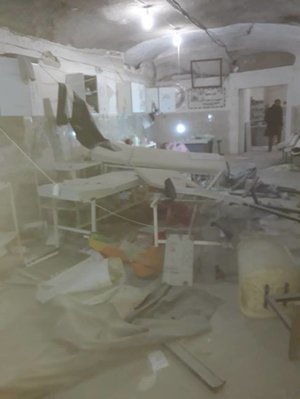
Kafr Zeita Cave Hospital after a regime airstrike, 1 February 2018. Syrian American Medical Society (SAMS)
We want to breathe, but we can’t - Victims of the Kafr Zeita attack, according to Dr Abdullah Darwish
The attack on Kafr Zeita wasn’t a one-off. The Syrian air
force has dropped more than 70,000 barrel bombs, and the regime is known
to have used chemical weapons on at least 330
occasions.
Barrel bombs and chlorine were the weapons of the cash-strapped regime. In the
first years of the war, Syrian President Bashar Assad’s regime was running out
of men, money and materiel. Stocks of missiles had reportedly dwindled, forcing the air force to improvise.
The size of the Syrian army fell from 325,000 to an estimated 150,000 in
2014. Syria's foreign exchange reserves halved, from US$18 billion to an estimated $5 to $10 billion,
as the conflict cost the regime as much as $1 billion per
month in 2012. Syria, once an oil exporter, also desperately needed fuel.
Damascus turned to Russia, to Iran and to networks of expatriate Syrians who stepped in as fixers, quietly providing the pariah regime access to international markets.
Enter Mudalal Khouri.
The Khouri network and other laundromats
Mudalal Khouri is an urbane Moscow-based Syrian-Russian financier, at the helm of the Khouri money laundering network.
As Global Witness has revealed in its report “Assad’s Money Men in Moscow”, the Khouri money laundering network has provided vital support to President al-Assad’s brutal regime including helping Syria’s chemical weapons and ballistic missiles programme.
A joint Global Witness-Organized Crime and Corruption Reporting Project (OCCRP) investigation has analysed leaked bank documents to uncover how the Khouri network appears to have received or processed money from a variety of frauds and received payments from key anonymous companies in other “laundromats.”
Laundromats are financial networks of banks and anonymous companies designed to move large amounts of money. They tumble and wash together money from legal businesses, private wealth, and organized crime to obscure its origins, avoid capital controls or evade taxes.
Our investigation links four companies – Balec Ventures, the sanctioned firm Argus Construction and, more tentatively, Tredwell Marketing and Armas Marketing – to the Khouri network. As we shall see, these firms also interacted with anonymous companies in three other laundromats, dubbed by OCCRP the “Proxy Platform,” the “Russian Laundromat,” and the “Troika Laundromat.” Khouri’s companies also received or processed millions from the notorious $230 million Russian tax fraud exposed by Sergei Magnitsky, a Russian lawyer who subsequently died after severe mistreatment in prison.
Moreover, companies controlled by the Khouri network appear to have received or processed funds from some well-known frauds. This includes receiving or processing funds from companies linked to apparently fraudulent payments to Sergei Roldugin, a close friend of Russian President Vladimir Putin, and from a separate fuel scam at Moscow’s Sheremetyevo International Airport.
The fraud Magnitsky uncovered
The Cyprus Mail and BuzzFeed News have previously reported that Balec Ventures received $2.2 million from the Russian tax fraud exposed by Sergei Magnitsky. However, the connections between the companies which laundered the proceeds of the fraud and the Khouri network are both more extensive than previously known and also predate the $230 million tax theft – which took place in late December 2007.
Alexander Perepilichny’s shell companies were used to launder the fraud proceeds. He later confessed and became a whistleblower, exposing the scheme. Another company belonging to Perepilichny, PF Realty, sent at least $1.1 million to Balec Ventures’ bank account on December 4, 2006, as soon as Balec Ventures’ account was opened. The transaction shows the Khouri network and Perepilichny had a relationship a year before the Russian tax fraud took place.
Financial Bridge: A Likely Meeting Place
A long-standing Khouri business associate was chief executive of an investment company part-owned by Alexander Perepilichny, later named in the Deutsche Bank and Danske Bank mirror trading scandals.
One of the Khouri network’s investment companies, Orient Finance, was founded in 2006 by Mudalal’s brother, Imad Khouri, together with a long-term business associate, Moscow businessman Pavel Abramov.
Abramov later served as Chief Executive of IC Financial Bridge from 2007 to 2009, a Russian company then part-owned by Perepilichny. Also a member of Mudalal Khouri’s family had worked at Financial Bridge, according an archived page from the firm’s website in 2006.
Later on, Financial Bridge was an intermediary in the Deutsche Bank and Danske Bank mirror trading scandals. Mirror trading involves simultaneous share transactions in different jurisdictions, used to facilitate movement of billions of dollars out of Russia “in a manner that is highly suggestive of financial crime,” according to the UK’s Financial Conduct Authority.
The New Yorker reported that IC Financial Bridge used the Deutsche Bank scheme. Similarly, the Estonian branch of Danske Bank involved in a 200 billion euro money-laundering scandal also reportedly executed mirror trades on behalf of intermediaries without knowing who the end customers were. According to the Danish newspaper Berlingske, IC Financial Bridge likely was one of those intermediaries. Russian authorities revoked Financial Bridge’s license in August 2013 for repeatedly violating securities and money laundering laws.
When laundering the tax fraud’s proceeds, Perepilichny’s Quartell Trading sent $2 million to Balec Ventures in late January and early February 2008, while $234,000 came to Balec via Nomirex Trading, a Proxy Platform laundromat company.
A company controlled by Dmitry Klyuev, the alleged mastermind of the $230 million fraud, may also have sent $750,000 in May 2008 to Tredwell Marketing via an intermediary anonymous company.
The cellist
Panama Papers leaks helped prove that famed Russian concert cellist Sergei Roldugin, one of Vladimir Putin’s closest friends, gained unexplained wealth through suspicious stock deals and control of offshore companies such as Panama-registered International Media Overseas. Core companies in the Troika Laundromat, such as Quantus Division, were used to send at least $69 million to firms linked to Roldugin from 2008 to 2010.
Notably, one of those payments was made on the same day as a transfer to Tredwell Marketing. On June 11, 2008 the people controlling Quantus Division’s multi-currency bank account converted $55,047 into 35,400 euros, and the next day 35,400 euros were paid to Tredwell. Other Quantus payments on June 11 included $756,300 to another core Troika Laundromat company, Delco Networks, which then paid almost the same amount ($755,300) to Roldugin’s International Media Overseas on June 12.
Employees of Troika Dialog, a large Russian investment business, set up the opaque financial system that has become known as the Troika Laundromat. When asked for comment the former chief executive said Troika Dialog was a financial intermediary which acted on client instruction to move funds from one custodian bank to another. He said that the company abided by money laundering and terrorist financing rules that existed at the time, and that he couldn’t have known about every deal his large company facilitated for its clients. The former chief executive denied ever knowing, or even hearing about, Mudalal Khouri or Tredwell Marketing. Reporters have found no evidence that he was ever investigated or accused of any wrongdoing by authorities and there is no suggestion that either he or other members of the Troika Dialog company had any knowledge of the Khouri network’s activities.
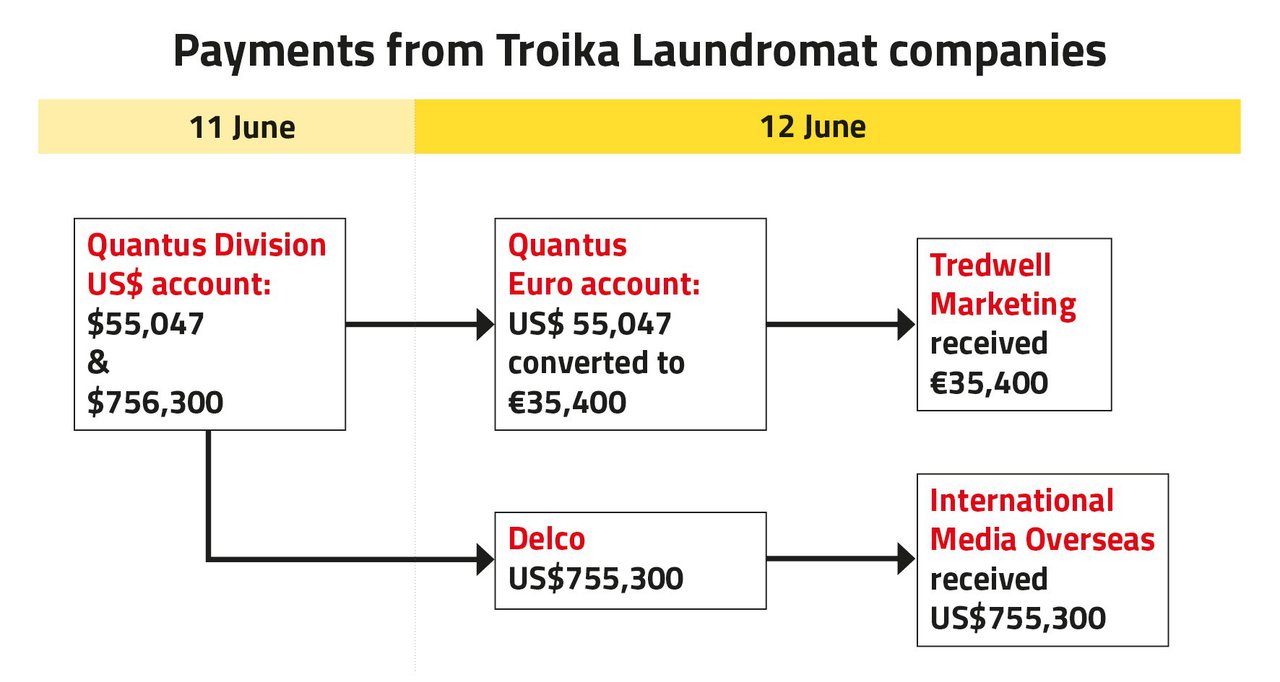
The Moscow Airport Fraud
The fuel scam at Moscow’s Sheremetyevo International Airport ran from about 2003 to 2008. It involved inserting several layers of shell companies into aviation fuel buys, inflating the price with each unnecessary layer. Novaya Gazeta and OCCRP have reported that some of the $200 million proceeds in 2006 and 2007 went through Iduna Commerce, a company in the Proxy Platform laundromat.
From September 2006 to October 2008, Iduna Commerce paid $20 million to another anonymous company, Brasnick Trading. From January to June, 2008, Brasnick Trading paid $1.1 million to the Khouri network’s Armas Marketing.Baltic Links
The Khouri network’s companies also appear in the Swedbank 37 billion euros money laundering scandal. In March, the Swedish bank published an independent report by the law firm Clifford Chance, which describes customers at Swedbank’s Baltic branches transacting with “companies connected to the alleged perpetrator of the Magnitsky fraud—an individual also reportedly linked to the Syrian chemical weapons program.” Issa al-Zeydi fits the description of the unnamed individual.
The human impact of laundromats
Fraud is not a victimless crime. The Khouri network was part of a common phenomenon in post-Soviet states where shadow financial systems were set up to enable massive capital flight. Laundromats stunt economic growth and deny ordinary citizens the money needed for functioning health and education systems.
The Khouri network in particular shows another danger: Laundromats are financial weapons. If you leave them lying around, they can be picked up and repurposed to help finance crimes against humanity.
In this instance, the Khouri network used its laundromat to attempt to help the Assad regime, disregarding the Syrian government’s repeated attacks on civilians using chemical and conventional weapons.
By providing some of the financial infrastructure that enabled the Syrian regime to rebuild itself, Mudalal Khouri indirectly shares responsibility for their suffering.
Banner image credit: Mohammed Badra/EPA-EFE/Shutterstock
You might also like
-
Press release Global Witness exposes international Syrian-Russian money laundering network financing brutal al-Assad regime
New report shows how Syrian-Russian money laundering network uses anonymous companies in the EU and UK Overseas Territories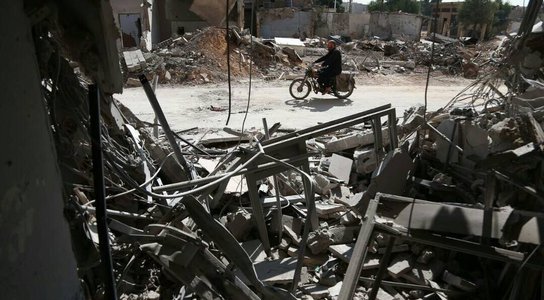
-
Article Assad Henchmen's Russian Refuge
Global Witness estimates that prominent members of the powerful Makhlouf family, cousins of dictator Bashar al-Assad, own at least US$40 million worth of property across two Moscow skyscrapers. Some of the same family members have been key in maintaining al-Assad’s grip on power.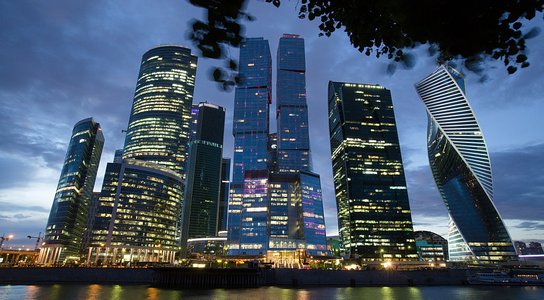
-
Report Assad’s Money Men in Moscow
An international money laundering network financing Syria’s brutal al-Assad regime uses anonymous companies in the EU and UK Overseas Territories